Family
Nikita's father was Prince Grigory Volkonsky, one of Suvorov's leading generals. His mother was the daughter and heiress of Prince Nikolai Repnin. His siblings included Prince Sergey Volkonsky, one of the prominent Decembrists, and Prince Nikolai Volkonsky-Repnin, the owner of Yagotin.
In 1810, Nikita married Princess Zinaida Beloselskaya-Belozerskaya (1792-1862) - writer, poet, singer and composer, Princess was a prominent figure of the Russian cultural life of the first half of the 19th century and was also a Catholic convert from Russian Orthodoxy. Their marriage gave birth to one son:
- Alexander (1811-1878), Privy Councillor.
Career
Volkonsky graduated from the First Cadet Corps. On 9 October 1792 recorded the ensign Praporshchik in Izmaylovsky Regiment. On 1 January 1796 hired by a second lieutenant in the same regiment. On 16 November 1800 Volkonsky dismissed from military service with the rank of captain. On 15 September 1801 he became a chamberlain adopted by the imperial court. On 15 January 1807 Volkonsky re-entered military service with the rank of lieutenant colonel and in the army was appointed adjutant to General Ivan Michelson - Commander of the Moldavian army. He participated in the battles against the Turks, won several awards, including a gold sword "for his bravery." On 15 September 1807 he was promoted to colonel and appointed adjutant to Alexander I. On 28 July 1812 Volkonsky was appointed composed of the Saint Petersburg militia, took part in the Second Battle of Polotsk, between October 6–7, and was wounded by a grenade in his right side, so that the 20 October 1812 he retired. On December 19 of that year he returned to work and was in the retinue Alexander I. In 1813 he participated in the Battle of Lutzen, Battle of Bautzen and Battle of Dresden. On September 15 of the same year he was made major general with admission to the Sweet. For distinction in Battle of Leipzig he was awarded with a gold sword "for bravery" with diamonds. In 1814 he fought at Battle of Brienne, Battle of La Rothière, Battle of Bar-sur-Aube, Battle of Arcis-sur-Aube, Battle of Fere-Champenoise and Battle of Paris (1814).
In 1815 he accompanied Alexander I on the trip to the Congress of Vienna. On 6 December 1827 was promoted to Jägermeister, in Russia corresponding the position of full general, listing a Privy Councillor.
At the end of his life, converted to Catholicism from his Orthodox religion by birth and moved to Italy. He was buried in the Santi Vincenzo e Anastasio a Trevi church, .

Prince Michael Andreas Barclay de Tolly was an Imperial Russian soldier of Baltic German and Scottish origin, who was commander-in-chief and Minister of War of the Russian Empire during Napoleon's invasion in 1812 and the War of the Sixth Coalition. Barclay implemented a number of reforms during this time that improved supply system in the army, doubled the number of army troops, and implemented new combat training principles. He was also the Governor-General of Finland.

Józef Grzegorz Chłopicki was a Polish general who was involved in fighting in Europe at the time of Napoleon and later.

Ivan Aleksandrovich Nabokov was a Russian Adjutant general and general of infantry prominent during the Napoleonic wars.
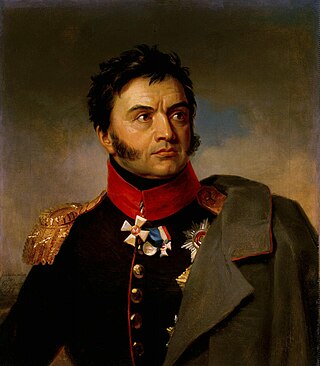
Nikolay Nikolayevich Raevsky was a Russian general and statesman who achieved fame for his feats of arms during the Napoleonic Wars. His family left a lasting legacy in Russian society and culture.
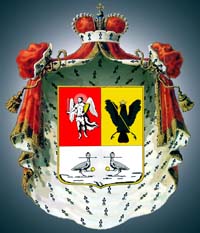
The House of Repnin, the name of an old Russian princely family of Rurikid stock. The family traces its name to Prince Ivan Mikhailovich Obolensky (+1523), nicknamed Repnya, i.e., "bad porridge". Like other Princes Obolensky, he descended from Mikhail Vsevolodovich, prince of Chernigov, who, in 1246, was assassinated by the Mongols.

Prince Sergei Grigorievich Volkonsky was a Russian Empire Major General and Decembrist from the aristocratic Volkonsky family.

Princess Zinaida Aleksandrovna Volkonskaya, was a Russian writer, poet, singer, composer, salonist and lady in waiting. She was an important figure in 19th-century Russian cultural life. She performed in Paris and London as an amateur opera singer.
Christoph Friedrich von Engelhardt was a Baltic German general and a hero of the storming of Izmail during the Russo-Turkish War of 1787-1792.

Lev Alexandrovich Naryshkin was a Russian Imperial aristocrat who fought in the Napoleonic Wars.

Peter A Dannenberg was a Russian general, particularly notable for his command during the Crimean War.
Prince Peter Mikhailovich Volkonsky (1861–1948) was a Russian aristocrat.
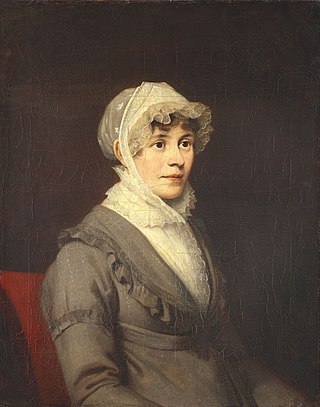
Countess Yekaterina Petrovna Rostopchina was a Russian aristocrat and writer. She was married to Fyodor Rostopchin, who served as governor of Moscow during the French Invasion of Russia.

Prince Nikolai Grigoryevich Repnin-Volkonsky was a general in the Imperial Russian Army.
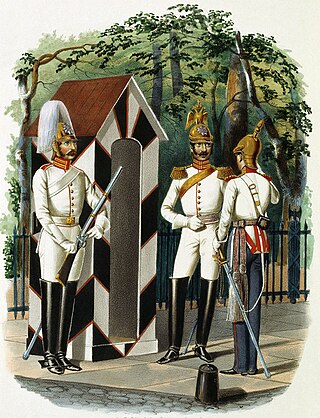
The Imperial Guards' Horse Regiment was a cavalry regiment of the Imperial guard of Russian Empire. The regiment was founded in the reign of Peter the Great and was disbanded after the October Revolution in 1917. Its annual feast day was 25 March.
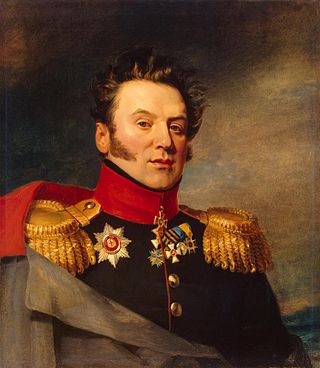
Konstantin Markovich Poltoratsky was a Yaroslavl Military and Civil Governor (1830–1842), lieutenant general of the Imperial Russian Army, a participant of five wars, including the French invasion of Russia.
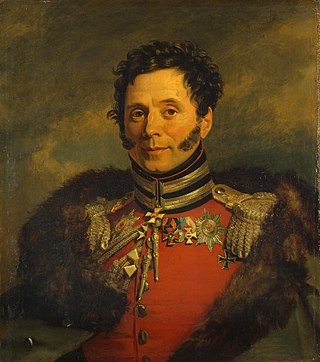
Nikolai Ivanovich Depreradovich was one of the most decorated Russian generals who fought against Napoleonic France. He was a general of the cavalry and adjutant general who took part both in Napoleonic Wars and Finnish Wars. His family, with roots in Serbian lands, moved to Imperial Russia in 1752.

Prince Alexei Borisovich Kurakin was a Russian statesman, Active Privy Councillor of the 1st class (1826), who held a number of top positions in the reign of Paul I and Alexander I. The direct ancestor of all subsequent Kurakin princes.
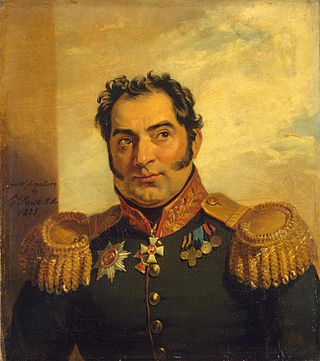
Nikolay Vasilyevich Vuich was an Imperial Russian general who fought in the Russo-Swedish War, Russo Turkish War, the Polish campaign and the Napoleonic Wars. He distinguished himself in all the wars in defense of Imperial Russia and contributed his mite in the success of the Coalition forces against Napoleon. His portrait now hangs at the 1812 Military Gallery of the Winter Palace.
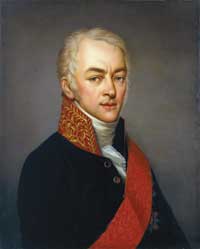
Count Alexey Kirillovich Razumovsky was a Russian statesman from the Razumovsky Family. Son of Count Kirill Razumovsky from a marriage with Yekaterina Naryshkina, brother of Andrey Razumovsky; son–in–law of Count Peter Sheremetev, father–in–law of Sergey Uvarov.
This page is based on this
Wikipedia article Text is available under the
CC BY-SA 4.0 license; additional terms may apply.
Images, videos and audio are available under their respective licenses.

















